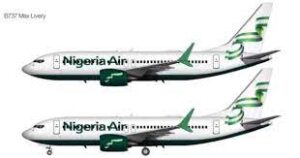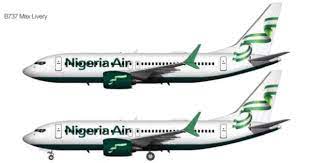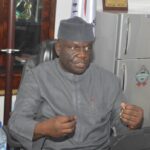
Six years after the plan was put into gear, the proposed national carrier for Nigeria, Nigeria Air will receive its Air Transport Licence (ATL) from the Nigerian Civil Aviation Authority (NCAA) today in preparation for the airline to start operation soon, after it has obtained its Air Operator Certificate, (AOC), which is a sequel to ATL.
The licence will be presented to the interim management of the airline at the headquarters of the aviation regulatory body in Abuja.
This was made known on the Instagram handle of the Ministry of Aviation @fmaviationng which reads, “The @NigerianCAA will on Monday, June 6th, 2022 present the Air Transport License (ATL) to the interim management of the #NigeriaAir, Nigeria’s national carrier at the NCAA’s Corporate headquarters, Nnamdi Azikiwe International Airport, Abuja”.
The Air Transport License is issued as authorisation to airlines to provide scheduled and non-scheduled services. It is one of the licenses received by airlines before they can commence operation just as they await the Air Operator Certificate (AOC) that fully guarantees them the right to begin air services.
Nigeria Air Limited had in April 2022 applied to the Nigerian Civil Aviation Authority (NCAA) for a license to operate scheduled and non-scheduled passenger and cargo services.
The company said this in a public notice as part of the requirements for granting an Air Operating Licence. The notice stated that any person or organisation with objection should make it known before 28 days expire.
“This is to inform the general public that Messrs Nigeria Air Limited has applied to the Nigerian Civil Aviation Authority for the grant of an Air Transport License to operate scheduled and non-scheduled passenger and cargo services within and outside Nigeria,” the notice reads.
X-raying the industry, director-general of NCAA said the promoters of Nigeria Air have applied for AOC and the process is still ongoing.
Nuhu said he has no assurances yet on when the license would be issued because, like all other airlines that apply for AOC, there are some issues that are not completely under the purview of the NCAA such as seeking security clearance for the applicant.
Nigeria Air has been expected to start operation since it was identified as one of the major projects of the President Mohammadu Buhari administration in the aviation industry.
The Minister of Aviation, Senator Hadi Sirika had promised that the airline would start operation in June/July. 2022 and the obtaining of ATL is a positive step to actualising that objective.
The Ministry of Aviation recently reiterated that the airline would be driven by the private sector but it is the responsibility of the government to midiwife the national carrier but would only have 5 per cent stake in the company, the technical partner would have about 49 per cent, while the rest would be acquired by local investors.
Although government has not given details about the potential stakeholders but recently it advertised for the bidding by technical partners, which inside Ministry sources said there was positive response by well known mega carriers of the world and recently Emirates Airlines said it would be willing to support Nigeria to establish its national carrier if it was invited to do so.
Also, Ethiopian Airlines had indicated interest to help Nigeria realise its objective of having a national carrier, which the East African carrier said was overdue.
However, industry analyst and former Commandant of the Murtala Muhammed International Airport, Lagos (MMIA), Group Captain John Ojikutu (retd) has expressed doubt about the planned national carrier and said that his worry was that it would go the same way like the defunct Nigeria Airways Limited (NAL) because there is nothing that is being done differently from the way the former national carrier was run, noting that it is government driven while the Ministry of Aviation is insisting that it is private sector driven.
He suggested that if it is private sector driven, why is government initiating the airline and wondered whether there was already visible indication of private sector interest in the airline.
“My fear about the national carrier is that it will go the same way as Nigeria Airways. I am not in support of it. How many African countries have national carrier now? South African Airways, Kenya Airways which are national carriers are having problems. It is only Ethiopian Airlines that is doing very well, but other national airlines are not doing well. Ghana, Congo, Cameroon don’t have national carrier, but they had in the past. If you say that the private sector will have 95 per cent, why not put the bidding out so that the private sector will drive it? Why are you midwifing it?” he said.
Also the President, Sabre Network West Africa, Dr. Gabriel Olowo, said that it is only the Minister of Aviation and his team who could correctly tell if the airline is ready to take off as planned.
Olowo who is also the President, Aviation Round Table (ART) also noted that national carrier for any country was no longer in vogue, describing it as a “mere nomenclature.”
He pointed out that the addition of the new airline would be a welcome development to the industry, but expressed worries about preferential treatment to the airline over and above the existing carriers in the sector.
Olowo also insisted that the airline must be private-sector driven and recalled the sordid experience of the former Virgin Nigeria Airways, maintaining that the government had no business in doing business especially in the airline sub-sector.
He noted that most aviation countries like the United States and United Kingdom no longer have a national carrier, insisting that any operator designated to fly the flag of any country is the national or flag carrier of such a country.
He said, “Tell me who the national carrier of the United States is. Is it American Airlines, Delta Air Lines, United Airline, Southwest Airlines, SkyWest Airlines or North West Airlines? Any operator that is designated to fly the flag across the nations of the world is the national/flag carrier of that country.

“As we know it today, Air Peace is the Nigeria flag carrier to the United Arab Emirates, South Africa and many West African countries, except otherwise. Our commonwealth spending is better prioritised in to more of security provision and basic needs such as making food more affordable, housing and health, among others,” he said.






